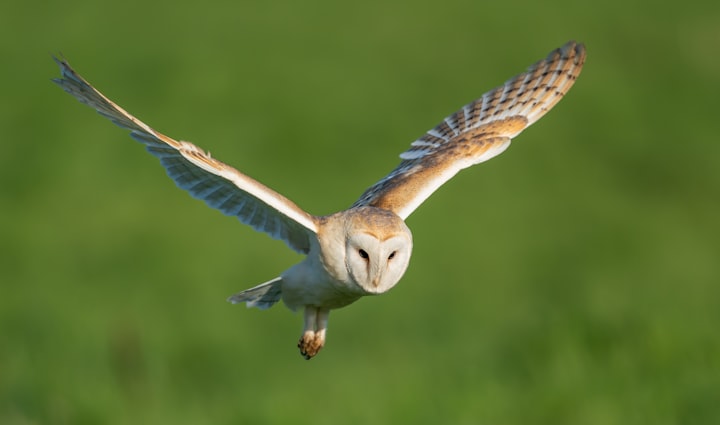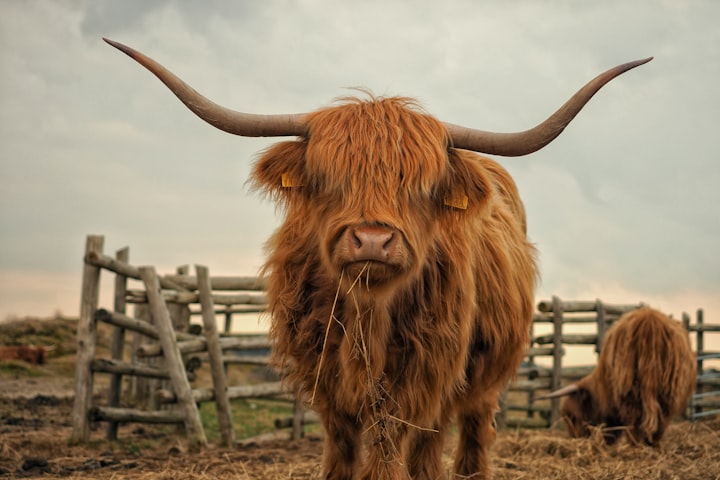Meg and the Midnight Owl
A Short Story about Superstition

The first time Meg saw the owl, it was nearly midnight on October 25, 1845, and she was sitting up in her dying grandmother’s bedroom. It was a grim task for a twelve-year-old, to be asked to watch as an old woman gasped her last few breaths and passed to the next life, but the household had been struck by illness that inauspicious month and with her brothers and sisters also sick, there was no one to spare to watch grandmother pass. Except for Meg.
The family were superstitious and to allow a loved one to die unwatched had the potential to allow evil spirits to latch onto her soul and prevent her from finding heaven. Meg had therefore been tasked with seeing that Grandma Schnippings’ last breath was taken without anything malign or supernatural occurring.
Meg did not care much for Grandma Schnippings. The old woman had a sharp tongue and spoke cruelly to the children, especially Meg as the eldest. She criticised her every move, saw nothing right with her. Meg found she did not much care if the old woman’s soul was prevented from getting to heaven – what right did a woman like her have to go there anyway?
Out of defiance – and also because she was tired – Meg shut her eyes and welcomed in any evil spirits who wanted to harm her grandmother. It was petty. It was nasty. It gave her great satisfaction. Except the old lady continued to breath and it did not look as though she was going to pass any time soon. She was stubborn to the last.
Meg sighed and opened her eyes to glance at the small window and see where the moon was in the sky. It was in that moment she saw the shape flash past. It was white in the moonlight and there for but a moment, but she heard its call, its shriek and it chilled her to the bone.
Trembling, not sure what she had just witnessed, Meg turned to her grandmother to feel the solidarity of another living soul nearby. That was when she discovered her grandmother was dead. Meg’s eyes started with horror, and she raced downstairs to her mother.
Her mother had heard the shriek too and was in a state of agitation checking all the children. When she saw Meg run in, she visibly relaxed.
“Your grandmother?”
Meg nodded her head, finding, strangely, that she wanted to cry.
“The owl,” her mother groaned. “The barn owl. They call when someone is about to die. I thought…”
She glanced at her children and a smile crept onto her face. She had not cared for Grandma Schnippings either and was glad she had been the one the owl had come for and not her children.
That was the first time Meg heard the owl, but it was not the last.
In the summer of 1851, Meg was working as a maid at an old rambling farmhouse, when one day she heard a muffled thud at the window. She walked into the kitchen yard and found sitting on the ground, looking dazed, a Barn Owl that had flown into the window. She stared at it for a long time, wondering what to do, for this was the supposedly demon creature that hooted when people died. Did she dare touch it?
She stood so long debating, that Old Bishop, the cattleman for the farm, came wandering over to see what she was about. When he saw the owl, he lit up.
“What a piece of luck! Hang a dead Barn Owl from the door of the house and all ill luck and misfortune it has brought us will be dispelled!”
“It is not dead,” Meg pointed out.
“I can deal with that,” Old Bishop said cheerfully.
The owl turned its head slowly in his direction, as if it were listening to his words.
“I shall wring its neck,” Old Bishop took a step forward.
Meg intercepted him.
“This house does not suffer from misfortune, and I think this fellow is just a bird,” she told him sternly.
“Not suffered… What about the death of the master’s wife? And his son dying not long after that? What about the poor wheat crop last autumn, or the sickening in the cattle soon after? If you do not consider that misfortune, what is it?”
“It is the world turning,” Meg shrugged at him and then she moved towards the owl and carefully picked it up.
She expected it to fight her, claw her arms or peck her hands. It did nothing, just sat in her arms. Old Bishop seemed stunned by this.
“Go back to your work,” Meg told him, stroking the owl’s head with a finger.
“You are a witch, that is what you are. Taming wild animals in an instant,” he looked scared, but then Old Bishop was one of the worst for superstitions.
“It is just a stunned bird,” Meg told him.
He was not convinced, and he hurried away. After he was gone, Meg took the Barn Owl into the coal shed where only she went and placed it on one of the roof beams. It sat there, hunched up, wings a little splayed. She was not sure it would survive, but it deserved a chance.
She left it alone, returning once or twice with slivers of bacon to tempt it to eat. The Barn Owl never moved from its perch, but it did eat. After a day and night like this, Meg concluded it could not fly and lifted it carefully from the beam to place it on the floor. It sat for a moment, then began to hop around, exploring the edges of the coal shed, but quite often bumping into the wall or her leg.
“Ah, so it is not your wings but your eyes that are broken!” Meg declared. “Well, my blind friend, I shall tend you and you shall not have to fear.”
Meg liked the little owl. It was affectionate when she picked it up and it was undemanding. Eventually she took it up to her room and made it at home there. It was no bother, and she liked its company.
Life had been acceptable until that point. Meg had wished for more but had been glad of what she had. She did not mind her work and she knew many were worse off than her. She never really considered that things might change.
Then one day the farmer’s nephew arrived. The death of the farmer’s son had left him without an heir, and he had started to be troubled by the notion. He had invited his nephew, a young man he had not seen in many years, to come to his home and see if he might be interested in taking over the farm one day.
Meg disliked the nephew from the moment he arrived. His name was James, and he had an arrogance to his step that he kept at bay when his uncle was present. She sensed his deceit straight away. Old Bishop was equally distrusting of James.
“He will sell the place as soon as he inherits,” he told her one day. “He has no love for this land.”
Meg told herself this did not really matter to her. She would get another job, perhaps at a fancier house where there was indoor plumbing for the sink, but in the dark of night, she would lay in her bed and confide her concerns to the owl. It would tilt its head and seem to be listening. She felt as though it understood.
One day, the worst day Meg had ever experienced in her life, James came upon her in the darkness of the pantry. She was checking over some apples she had stored for the winter when she sensed him behind her. She turned to ask what he wanted, but before she could speak, he had grabbed her and shoved her against the wall.
She smelt drink on his breath, and she felt his pressure against her body. She tried to struggle free, and he slapped her so hard her head flicked back into the wall, and she tasted blood in her mouth. Too dazed to fight, she endured his attentions. When he was done, he left her crumpled on the pantry floor and walked off. She hated him at that moment, in a way that made her chest hurt.
There was no one to speak to other than the owl, and that night she sobbed into its feathers and told it the story. It leaned closer as she spoke.
“I wish he was dead,” Meg cried, knowing her wishes never came true.
The owl pecked her with its beak, a sign it wanted her attention and she glanced into its little face. Just for a moment, she thought she saw something behind its dull, blind eyes. Something familiar. She frowned, but it was just her imagination.
The following day, James fell from his horse. No one knew how it happened. The first sign of trouble was when the horse returned without a rider. A search was made, and James was found tumbled in a meadow, quiet and unmoving. He was brought back to the farmhouse and Meg was tasked with tending to him. She resented the duty but could not refuse.
Day after day, she slipped water and soup into his mouth, waiting for him to open his eyes and be back with them. It looked as though he would never awaken, and his uncle despaired. Meg was simply glad. She hoped he would never open his eyes again, even though she knew it was a wicked thought.
Then, on the fourth day, Meg walked into the room to find James staring at her and mumbling to himself.
“Where am I?”
She tried not groan at the sight of him awake. That night the tears returned as she confided to the little owl how she had hoped he would die and now it seemed he would be fine. The doctors were very pleased with his progress. Soon he would be out of bed, they said.
When she had cried herself out, the owl pecked at her hand, and she glanced at it. Once again, she thought she recognised something behind its eyes, something she had not noticed before. Meg shook her head, replaced the owl on its perch and went to sleep, trying not to think about the future.
The next day, Meg walked into the bedroom where James was sleeping and nearly jumped out of her skin at the sight of the blind owl stood quite calmly on the man’s bed.
“How did you get out?” Meg said softly, reaching for the bird.
The bird seemed to be concentrating deeply on James and did not look at her. She gently picked it up and returned it to her room, making sure the door was shut this time. She carried on with her duties and the day passed as usual, except that James said he felt more tired than before and did not want his dinner.
Late in the afternoon, Meg checked on her patient and was surprised to find the blind owl once again on the bed. It was stood on James’ chest and was staring intently at his face. Meg watched it for a moment, wondering how it had escaped her room and why it was so interested in the patient.
James took a fluttering breath; it was almost a gasp, and the owl took a careful step closer.
Meg moved into the room, not sure what she was seeing. James’ took a rattling breath this time, hardly making his chest rise at all. The owl did not budge.
Meg was feeling uneasy now. She moved closer to the bed, not sure quite what was bothering her. She reached out a hand towards the owl, to move it away and in a flash, it stabbed its beak at her fingers and drew blood.
Meg made a hiss of pain and stepped back. The owl had never bitten her before. She was stunned.
“You cannot be here,” she said, the words sounding shaky. “He needs to rest.”
The owl moved its wings as if shrugging at her. Meg had a chill running up and down her spine.
“What do you want?”
The owl walked the last couple of steps to enable it to stand on James’ face, then it dropped its head so it was nearly touching his nose and stared and stared.
“It is rabid,” Meg told herself, not sure that an owl could become rabid, but it seemed the only solution. “It has gone quite mad.”
She went to a chest and fetched a blanket, determined to bundle up the owl and remove it. Perhaps, after all, Old Bishop had been right about killing it. As she was returning to the bed, James took a sudden breath and the noise of it made Meg stop. She knew that noise.
Hardly daring to bre ath herself, she walked towards the bed head. The owl hopped away to the foot of the bed and left her to discover that James was dead.
Meg did not know what to think at first, then she glanced at the owl. It tilted its head at her in a way she knew too well. Not the way of an owl, but the way of a person.
“Grandma Schnippings?”
The owl fluttered to the floor and hopped out of the room and back upstairs. Meg would have followed, but first she had to inform the master that his nephew was dead.
Her master took the news badly, as was to be expected, and it was many hours before she was able to climb up to her room exhausted. Her bedroom door was closed as she had left it. She still could not fathom how the owl had escaped. She was trying not to think about what she had seen – and thought – down in James’ bedroom.
She entered her room and discovered it was empty. No sign of the owl.
She sat on the bed and stared at the empty perch. What had she seen? Her mind went back in time, to a young girl sitting beside her grandmother, hoping the evil spirits would take her and an owl flying past the window. Had something happened that night she had not realised?
None of it made sense. She stretched out on her bed, but weariness was replaced by curiosity and alarm. Had her grandmother somehow been transported by evil spirits into the body of an owl? Had her callousness condemned her grandmother to existing in a bird’s body?
And, if so, why had she come back to Meg? Why had she been her companion? Meg thought of James again.
No, it was crazy. Birds could not suck the living breath from people. She had never believed such nonsense, why start now?
Still, she really hoped to never see a Barn Owl again and, if she did, she would make sure to keep well out of its way.
About the Creator
Sophie Jackson
I have been working as a freelance writer since 2003. I love history, fantasy, science, animals, cookery and crafts, (to name but a few of my interests) and I write about them all. My aim is always to write factual and entertaining pieces.






Comments
There are no comments for this story
Be the first to respond and start the conversation.